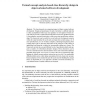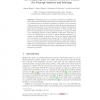11 search results - page 2 / 3 » fca 2005 |
ICFCA
2005
Springer
13 years 10 months ago
2005
Springer
A key difficulty in the maintenance and evolution of complex software systems is to recognize and understand the implicit dependencies that define contracts that must be respecte...
ITCC
2005
IEEE
13 years 10 months ago
2005
IEEE
models evolve at different levels of abstraction, from the requirements specification to development of the source code. The models underlying this process are related and their ...
FCA
2005
Springer
13 years 10 months ago
2005
Springer
The class hierarchy is an important aspect of object-oriented software development. Design and maintenance of such a hierarchy is a difficult task that is often accomplished witho...
ICCS
2005
Springer
13 years 10 months ago
2005
Springer
Abstract. Minimal generators (mingens) of concept intents are valuable elements of the Formal Concept Analysis (FCA) landscape, which are widely used in the database field, for da...
ICFCA
2005
Springer
13 years 10 months ago
2005
Springer
Minimal generators (or mingen) constitute a remarkable part of the closure space landscape since they are the antipodes of the closures, i.e., minimal sets in the underlying equiva...


